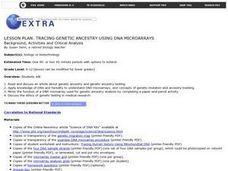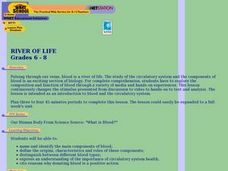Curated OER
3-D Cell Model
Life science laureates choose a plant or animal cell to construct a model of as an at-home project. This handout provides guidelines, suggested materials, and a grading rubric for their reference. A full-page letter to parents is also...
Curated OER
Early Filtrate Functioning
In this biology worksheet, students look at the function of filtering in the nephron of the kidneys and the biochemistry is emphasized.
Curated OER
Hear No Evil
Students explore the function of the ears. For this sense of hearing lesson, students read the book Polar Bear, Polar Bear What Do You Hear and discuss the things the Polar Bear heard. Students construct simple musical instruments and...
Curated OER
Tracing Genetic Ancestry Using DNA Microarrays
High school learners read and discuss an article about genetic ancestry and genetic ancestry testing. They complete a paper and pencil activity that mimics the function of a DNA microarray and consider the ethics of genetic testing in...
Curated OER
Structure and Function of Bulbs, Corms and Rhizomes
Middle schoolers explore the concept of philanthropy and why people give. They investigate the importance of the tulip to Holland and the tradition of giving flowers away. They begin to explore the life cycle of tulips and dissect a bulb...
Curated OER
Regents High School Exam: Living Environment 2008
Tne New York Regents High School Examinations are comprehensive and include various styles of questions, includingmultiple choice and the analysis of graphs. This particular version, the 2008 Living Environment exam surveys a variety of...
Curated OER
Animals and Humans
Young scholars identify the functions of various body parts. They participate in the "Head, Shoulders, Knees, and Toes" song, draw a picture of themselves and other mammals, and create a traced outline of their body that they add...
Teacher Web
Plant Reproduction—Structure of a Flower
What happened to the plant in math class? It grew square roots. Here, a set of 11 worksheets provide a review of plant reproduction. It includes the structure of a flower and each part's function, pollination, fertilization, seed...
Curated OER
Dirt Cups
After a hard day examining and dissecting worms, why not put your feet up and snack on a few? Here is a really cute idea that can be used to celebrate Earth Day or to accent a thematic learning experience. Kids use clay pots, gummy...
Biology Junction
Seed Plants: Gymnosperms and Angiosperms
One of the reasons plants found success on land relates to seed development. Scholars learn about many different forms of seeds and how they changed over time. It describes the structure and function of many different types of seeds in...
Biology Junction
Introduction to Biology
Welcome to Biology! Introduce pupils to a subject conceptualized by Aristotle in 300 BC through a presentation and worksheet. It covers the themes of biology, characteristics of life, the scientific method, microscopes, and measurements.
Nemours KidsHealth
Asthma: Grades K-2
Students explore asthma. In this respiratory system and asthma lesson, students identify the body parts related to the respiratory system and explain each part's function. Students construct a 3-D replica of the respiratory system...
Curated OER
You are Uniquely You
Young scholars compare and contrast simple machines and their functions. In this cross-curriculum science simple machines lesson, students observe examples and read about simple machines, then use body movement to demonstrate how...
Curated OER
Inheritance Patterns in Zorks
In this inheritance patterns worksheet, high schoolers create a visual of a Zork using chromosome strips to represent alleles from the father and the mother to determine the traits in the offspring. Students translate the genotype to the...
Curated OER
River of Life
Students explore the composition and function of blood through a variety of media and hands-on experiences. This lesson is a very good introduction to blood and the circulatory system.
Curated OER
How the Brain Learns
Students identify the basic function of the lobes in the brain. In this memory lesson students complete a lab activity on how fast they can react.
Curated OER
Exploring The Depths!
Fifth graders make a model of the ocean floor. In this ocean characteristics lesson, 5th graders complete a KWL chart about the ocean floor, use the Ocean Depth Data Sheet to create a graph, and create a 3-D model of the ocean floor.
Curated OER
Give Me Some Sugar, Honey!
Students research the history of honey and different products that come from honey. In this bees and honey lesson, students review how honey is made, discuss ways people use honey, research the history of honey and its uses, create...
Serendip
Soap Opera Genetics – Genetics to Resolve Family Arguments
Did she cheat on her husband? Did the hospital switch the babies? Should they have children? As much as this sounds like the plot for a soap opera, all of these questions fit into a single lesson on genetics. Scholars read about three...
Curated OER
Keep In Touch: Communications and Satellites
Fourth graders explore communications by reading assigned space science text. For this satellite lesson, 4th graders identify the concept of orbiting and examine gravitational pull by viewing diagrams. Students are assessed based on...
Curated OER
Presentations
Students give presentations. In this unit culmination lesson, students present their bridge projects to parents. Students test their bridges and are evaluated using a rubric.
Curated OER
Genetics
Students explain the difference between dominant and recessive genes, identify what causes differences in the traits of parents and their offspring, and explain how sex is determined. They will also improve their reading and...
Curated OER
WHAT IS A CELL?
Students explore the function and structures of cells, including plant and animal cells. They explore cell parts including cell wall, ribosomes, chromosomes, nucleoid, plasmids, flagella, pilli, and plasma membrane, cel
Curated OER
And The Beat Goes On...!
Students explore the circulatory system. They observe a dissection of a heart and view the path that blood takes through the heart and the circulatory system. Students identify the structures and functions of the heart. They write a...
Other popular searches
- Math Parent Functions
- Parent Functions and Graphs
- Graphing Parent Functions
- Parent Functions Activity
- Six Parent Functions
- Parent Functions Real World
- Quadratic Parent Functions
- Algebra Parent Functions
- Linear and Parent Functions























